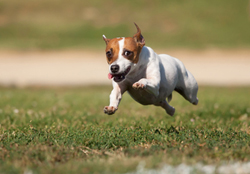 Imagine you are at the park throwing the ball for your dog, or jogging next to your canine companion. Is he moving his hind quarters freely, easily and comfortably? Stiffness, swelling, favoring and soreness are all common signs of knee problems, and can happen at any age, size or breed of dog. Catching the symptoms the moment you notice them can help your dog have a faster and more complete recovery or healing process from the two most common knee problems; luxating patella and torn or ruptured cranial cruciate ligament.
Imagine you are at the park throwing the ball for your dog, or jogging next to your canine companion. Is he moving his hind quarters freely, easily and comfortably? Stiffness, swelling, favoring and soreness are all common signs of knee problems, and can happen at any age, size or breed of dog. Catching the symptoms the moment you notice them can help your dog have a faster and more complete recovery or healing process from the two most common knee problems; luxating patella and torn or ruptured cranial cruciate ligament.
What is Luxating Patella?
Have you ever had a dislocated joint? Humans often times, at one point in their life, will dislocate their shoulder or a digit. A dog’s luxating patella is a fancy way of saying dislocated knee cap! Caused often from trauma directly to the dog’s knee or genetic predisposition, any breed can be susceptible to the condition. Some breeds, specifically small breeds like Pomeranians and Chihuahuas are more likely to find themselves favoring a back leg.
Typically, when the knee cap slips out of position it can quickly fix itself simply by the dog relaxing his leg muscles. At that point, it just goes right back into its proper anatomical position and can function normally. You can view this happening whenever your dog holds up one of his hind legs for a few moments. He is relaxing those muscles so his knee cap can slip back into place. Luckily, the knee cap out of place alone does not cause pain. The movement of the cap slipping back into place can be felt by your pooch and be uncomfortable.
However, luxating patella can be far more severe, and include degenerative arthritis. If it goes untreated and ignored, the condition can lead to lameness in your dog. This means he will not have the mobility he should have and his activities will be limited. It can be diagnosed by your veterinarian through taking X-rays and a fluid sample from the joint itself. Once found, treatment can begin. Only in the worst of cases is surgery considered. Otherwise, managing the condition with preventing harsh exercise and allowing the dog to rest for up to one month after a dislocation occurs to allow healing.
What is Ruptured Cranial Cruciate Ligament?
Known as the ACL in humans, this ligament connect the bone above the knee, or femur, to the tibia below the knee. Primarily occurring in large breed dogs like Rottweilers and Labrador Retrievers, the CCL injury is perhaps the most often seen in veterinary orthopedic offices. Animals that are overweight or obese also have a high chance of experiencing this condition as their legs are strained from the added weight. This ligament is in charge of keeping the tibia in place and stabilizing the knee joint. When it becomes injured, the dog may no longer be able to put weight on the injured leg, become completely lame, and/or exhibit swelling around the knee area.
A physical exam on your dog will help to find any injuries to his cranial cruciate ligament and test it’s severity. A veterinarian will feel the dog’s leg, hold the femur in place while moving the tibia forward to find what is known as the drawer sign; an indication of a rupture or tear. Symptoms often gradually get worse and become more obvious as the ligament becomes more damaged over time.
Smaller dogs have a quicker recovery time as a partially ruptured or torn ligament will heal on it’s own with little to no exercise. However, if left untreated any CCL injury can cause further damage to the dog’s leg as the bones begin to rub together when the join is used, causing pain. Surgical and non-surgical options are available and should be discussed with your veterinarian.
Don’t Wait, It May Be Too Late
If you ever suspect any amount of pain, discomfort, swelling or otherwise unnatural behavior and movements in your dog’s hind legs seek veterinary attention immediately. Both a luxating patella and a cranial cruciate ligament injury are no joke, and should be treated as soon as possible to prevent lameness in your pet. If you wait, it may be too late!
Visit Pampered Paw Gifts to Find All Natural Supplements for Your Dog’s Health